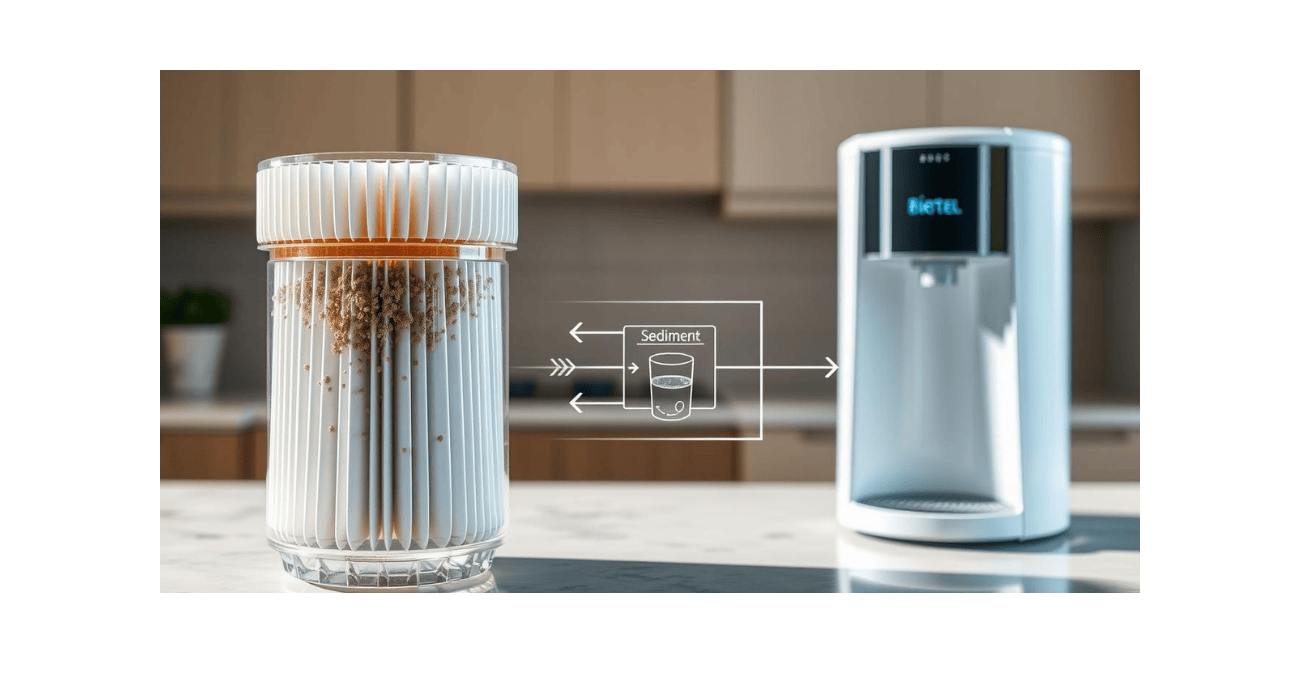
Sediment Filtration: Protecting Your Countertop Water Dispenser
Ever wondered why your countertop water dispenser suddenly slows down or tastes off? Blame sediment! Tiny particles like rust or silt can clog and damage your system. The solution? Regular sediment filtration to boost Filtration Performance and keep water crisp. Keep reading for tips to protect your dispenser effortlessly.
Understanding Sediment Filtration (Sediment Filtration Basics)
Picture this—you’ve just poured yourself a glass of water, expecting it to be crisp and clear. Instead, it’s cloudy and has a slightly odd taste. Sound familiar? That’s likely sediment making an unwanted appearance. Keeping your water dispenser clean isn’t just about hygiene—it’s about performance too. Sediment, if left unchecked, can slow down water flow, clog internal parts, and even shorten your dispenser’s life.
What is Sediment? (Sediment Definition)
Sediment is basically the uninvited guest in your tap water. These are tiny particles like rust, dirt, sand or minerals that sneak into your system from various sources. They might come from eroded rocks, corroded old pipes, or leftovers from water treatment processes. While small, they can cause big issues if not filtered out.
Types of Sediment (Types of Water Sediment)
Let’s get specific. Here are a few common types of sediment UK households might find:
-
Silt and Sand: Usually found in homes using groundwater or from post-rainfall run-off.
-
Rust and Iron: From ageing metal pipes, giving water a brownish tinge.
-
Minerals: Like calcium and magnesium, especially in hard water regions.
-
Organic Particles: Bits of decayed plant material or microbes, more common in rural water supplies.
Each type can affect water clarity, taste and the performance of your dispenser.
How Sediment Filtration Works (Sediment Filtration Process)
Here’s where the magic happens. Sediment filtration is your first line of defence, catching particles before they reach your glass. Different filters use different techniques, but the goal is the same: trap the bad stuff while letting fresh, clean water flow through.
Mechanical Filtration (Mechanical Sediment Filtration)
Think of mechanical filters like a sieve—but with superhero powers. As water passes through, the filter captures particles based on size. The smaller the micron rating, the finer the filtration. Here are a few filter types you’ll often find:
-
String-Wound: Ideal for larger debris and great for homes with older plumbing.
-
Pleated: Offers more surface area, so it catches more particles in one go.
-
Depth Filters: Multi-layered and built to tackle sediment from all angles.
Benefits of Sediment Filtration for Countertop Dispensers (Sediment Filtration Benefits)
Installing a sediment filter may not sound exciting, but it’s one of the best things you can do for your dispenser. Here’s why.
Protecting Dispenser Components (Dispenser Component Protection)
Your dispenser’s inner workings—like valves, heating elements and nozzles—don’t get along with sediment. Those tiny particles can build up over time, leading to blockages and wear. A decent filter keeps all that gunk out, protecting the components you rely on daily.
Preventing Clogging (Water Dispenser Clogging)
Ever noticed the water flow getting slower? That’s often a sign of sediment build-up. Clogged nozzles and pipes can mean poor water pressure, strange noises or even total shut-off. Filtration stops the issue before it starts.
Extending Dispenser Lifespan
Let’s be honest—no one wants to replace appliances earlier than necessary. Sediment, although tiny, can be surprisingly harsh on internal parts. With a good filter in place, you’ll avoid premature damage and keep your dispenser running smoothly for years. It’s a small upgrade that pays off long-term.
Conclusion: Enjoying Clean, Crisp Water Every Day
There’s something satisfying about pouring yourself a fresh glass of water—clear, cool and great-tasting. That’s what sediment filtration helps deliver. It’s not just about taste either. Clean water protects your dispenser, saves you money on repairs, and ensures your family drinks safe, contaminant-free water. If you live in a hard water area or have older pipes, it’s even more important. Luckily, brands like Brita, Pureit and others offer UK-friendly systems that are easy to install and maintain. So, choose the right filter, stick to a regular maintenance schedule, and enjoy water the way it’s meant to be—pure, reliable and refreshing every time.
More Countertop Water Dispenser info we think you'll love
Well Water Woes? Find the Perfect Countertop Dispenser for Clean, Safe Water
Best Countertop Water Dispensers for Hard Water: Top Picks & Tips
How Reverse Osmosis Works in Countertop Water Dispensers
Activated Carbon Filtration: What It Removes and How It Works
UV Purification: How Light Disinfects Your Countertop Water
Understanding Filter Pore Size: What It Means for Your Countertop Water


Leave a comment